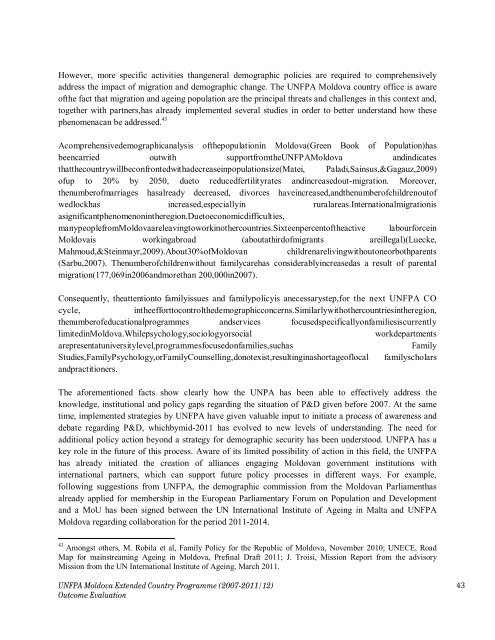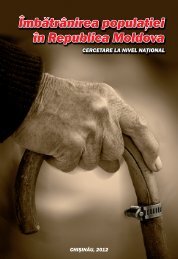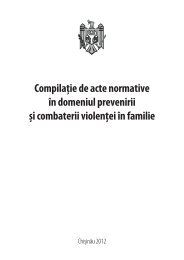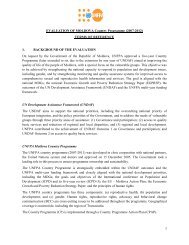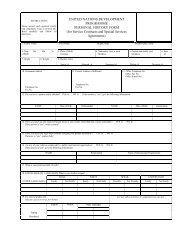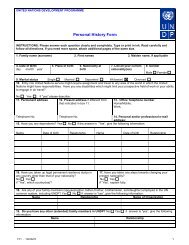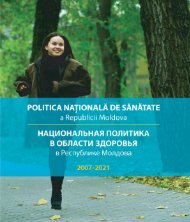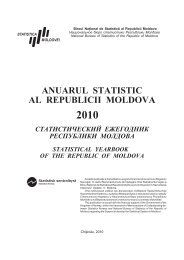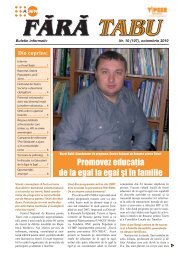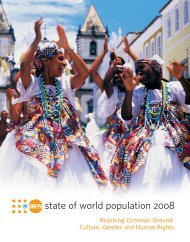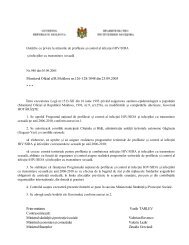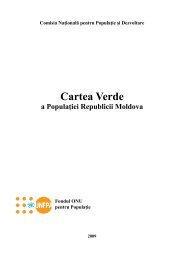Country Programme (2007-2011/2012) evaluation - UNFPA Moldova
Country Programme (2007-2011/2012) evaluation - UNFPA Moldova
Country Programme (2007-2011/2012) evaluation - UNFPA Moldova
You also want an ePaper? Increase the reach of your titles
YUMPU automatically turns print PDFs into web optimized ePapers that Google loves.
However, more specific activities thangeneral demographic policies are required to comprehensively<br />
address the impact of migration and demographic change. The <strong>UNFPA</strong> <strong>Moldova</strong> country office is aware<br />
ofthe fact that migration and ageing population are the principal threats and challenges in this context and,<br />
together with partners,has already implemented several studies in order to better understand how these<br />
phenomenacan be addressed. 43<br />
Acomprehensivedemographicanalysis ofthepopulationin <strong>Moldova</strong>(Green Book of Population)has<br />
beencarried outwith supportfromthe<strong>UNFPA</strong><strong>Moldova</strong> andindicates<br />
thatthecountrywillbeconfrontedwithadecreaseinpopulationsize(Matei, Paladi,Sainsus,&Gagauz,2009)<br />
ofup to 20% by 2050, dueto reducedfertilityrates andincreasedout-migration. Moreover,<br />
thenumberofmarriages hasalready decreased, divorces haveincreased,andthenumberofchildrenoutof<br />
wedlockhas increased,especiallyin ruralareas.Internationalmigrationis<br />
asignificantphenomenonintheregion.Duetoeconomicdifficulties,<br />
manypeoplefrom<strong>Moldova</strong>areleavingtoworkinothercountries.Sixteenpercentoftheactive labourforcein<br />
<strong>Moldova</strong>is workingabroad (aboutathirdofmigrants areillegal)(Luecke,<br />
Mahmoud,&Steinmayr,2009).About30%of<strong>Moldova</strong>n childrenarelivingwithoutoneorbothparents<br />
(Sarbu,<strong>2007</strong>). Thenumberofchildrenwithout familycarehas considerablyincreasedas a result of parental<br />
migration(177,069in2006andmorethan 200,000in<strong>2007</strong>).<br />
Consequently, theattentionto familyissues and familypolicyis anecessarystep,for the next <strong>UNFPA</strong> CO<br />
cycle,<br />
intheefforttocontrolthedemographicconcerns.Similarlywithothercountriesintheregion,<br />
thenumberofeducationalprogrammes andservices focusedspecificallyonfamiliesiscurrently<br />
limitedin<strong>Moldova</strong>.Whilepsychology,sociologyorsocial<br />
workdepartments<br />
arepresentatuniversitylevel,programmesfocusedonfamilies,suchas<br />
Family<br />
Studies,FamilyPsychology,orFamilyCounselling,donotexist,resultinginashortageoflocal familyscholars<br />
andpractitioners.<br />
The aforementioned facts show clearly how the UNPA has been able to effectively address the<br />
knowledge, institutional and policy gaps regarding the situation of P&D given before <strong>2007</strong>. At the same<br />
time, implemented strategies by <strong>UNFPA</strong> have given valuable input to initiate a process of awareness and<br />
debate regarding P&D, whichbymid-<strong>2011</strong> has evolved to new levels of understanding. The need for<br />
additional policy action beyond a strategy for demographic security has been understood. <strong>UNFPA</strong> has a<br />
key role in the future of this process. Aware of its limited possibility of action in this field, the <strong>UNFPA</strong><br />
has already initiated the creation of alliances engaging <strong>Moldova</strong>n government institutions with<br />
international partners, which can support future policy processes in different ways. For example,<br />
following suggestions from <strong>UNFPA</strong>, the demographic commission from the <strong>Moldova</strong>n Parliamenthas<br />
already applied for membership in the European Parliamentary Forum on Population and Development<br />
and a MoU has been signed between the UN International Institute of Ageing in Malta and <strong>UNFPA</strong><br />
<strong>Moldova</strong> regarding collaboration for the period <strong>2011</strong>-2014.<br />
43 Amongst others, M. Robila et al, Family Policy for the Republic of <strong>Moldova</strong>, November 2010; UNECE, Road<br />
Map for mainstreaming Ageing in <strong>Moldova</strong>, Prefinal Draft <strong>2011</strong>; J. Troisi, Mission Report from the advisory<br />
Mission from the UN International Institute of Ageing, March <strong>2011</strong>.<br />
<strong>UNFPA</strong> <strong>Moldova</strong> Extended <strong>Country</strong> <strong>Programme</strong> (<strong>2007</strong>-<strong>2011</strong>/12)<br />
Outcome Evaluation<br />
43


